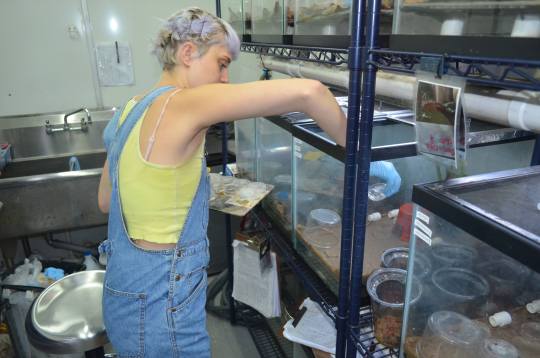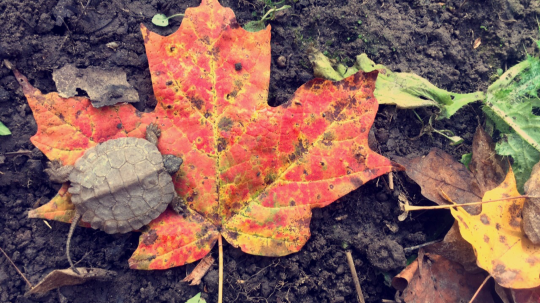By Sarah Nason
Could zoos and aquariums be the solution for species in decline? This might seem like a paradoxical suggestion: working with animals in captivity to help them flourish in the wild. But the vision of the new federally-funded research program in Canada, ReNewZoo, is much broader than that: the program is bringing together academic researchers and zoo professionals to conduct research together that would put zoos at the centre of conservation efforts.
“Zoos are only displayed as the entertainment, on the surface. And people don’t see the research behind it,” explains Tanis Mercer, the ReNewZoo program coordinator. “But I know all these super dedicated people who are working on being able to rehabilitate and address certain environmental concerns.”
Mercer comes from an incredibly diverse background, being trained as an educator, artist and science communicator – and her influence shows in the design of ReNewZoo. The program is training Master’s and PhD students to work specifically at the interface of academic research and zoo/aquarium management to achieve conservation outcomes. Here, she expands more on how she became involved with the project, what it means for wildlife conservation in Canada, and how educational strategies are a huge part of that.
On getting involved with zoos and aquariums
Working somewhere where the initiative agrees with my core values is a very important thing for me, and zoos and aquaria are very interesting to me from a broader scope. I also have a very strong pull towards making things practical. I find in science it’s easy to make things practical because you have your lab component, and you have your experiments, and you have fieldwork, but not necessarily within the organization [university, program] itself. And having that agrees with me in terms of my understanding of education and pedagogy. I just felt that this program would really help students to achieve things. Not just on paper, but in terms of their skill development, and that is one of the things that is very dear to me. Because I’m an educator, I care for students, and I want the best possible outcome to happen for all students that are going through this really time-consuming, blood-sweat-and-tears, laborious activity that is becoming educated.

On the goals for ReNewZoo
There’s nothing like this program, particularly in terms of merging universities with zoo and aquarium institutions. Speaking from my personal opinion, I hope we can lead governments, NGOs, lobby groups, and other large-scale industries to recognize that gap, and to invest in trying to close it. If we can get students through the program and they outshine the competition, then obviously there’s something there worth taking another look at. I feel like university education needs a bit of an overhaul. Not completely from the ground up, but it needs more emphasis on training people for real jobs. Academic institutions need to start investing in, if only just entertaining, the idea that perhaps there’s more they can do to ensure that all students, not even just biology/conservation students, have a way to make what they love and what they study workable as a career. Something that adds to the community, the country, and the academic culture of Canada and the rest of this world.
On communicating science
As an educator I am constantly perplexed that there seems to be a gap in the philosophical understanding of what science is as a discipline. People seem to not understand that we have the products of science, the technologies that arise, the knowledge, the books, the information, but that’s not science: that’s its products. It’s a method, it’s a way of seeing and interrogating the world and phenomena. Actually, one of the ReNewZoo advisors is Dr. Chantal Barriault. She is the co-director of the science communications program at Laurentian University. We understand that there’s so much that can be gained from pulling that aspect of it into a program such as this. Instead of just doing a Master’s of Science, students are also getting all of this worldly experience outside of that, including science communication.

On advice for students interested in wildlife conservation
From an educator’s perspective, I think that a lot of students – I don’t want to say that they don’t think of it, because it’s not their job to think of it – know how they learn. Understand how you learn best. Understand where your strengths are intellectually, and use those strengths to teach where you’re weaker. If you can do that, you can do anything. And [two]: find something you’re passionate about. Because people can live an awful long time doing jobs that they do not find rewarding, either professionally or intellectually or in terms of their values. Test the waters. If you don’t know what you want, use a gap year. And if you end up in an area of academia that is more theoretically based or more research based, try to diversify your skill set. Try to find a way to apply it in the world: try to find something that will give you a practical edge. Because if you can do that, there’s a job for you.
Tanis Mercer is the Program Coordinator for the NSERC CREATE ReNewZoo Research and Training Program based out of Laurentian University in Sudbury, Ontario. Ms. Mercer has obtained her graduate diploma in Science Communications from Laurentian University, as well as a Bachelor of Education from Nipissing University. When Tanis is not coordinating and working in curriculum design, she is a dedicated Overwatch Mercy main that is currently disappointed in Jeff Kaplan’s decision to nerf her beloved character into the ground.

0 Comments